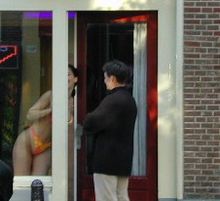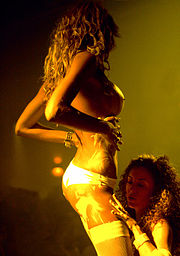- Sex industry
-
"Adult entertainment" redirects here. For the album by Raffi, see Adult Entertainment (album).
 A sex worker in Germany
A sex worker in Germany
The sex industry consists of businesses which either directly or indirectly provide sex-related products and services or adult entertainment. The sex industry includes adult sex-related products and services such as prostitution in all its forms, pornography in all its forms, sex shops, strip clubs, sex-oriented men's magazines, sex movies and sex channels for television, besides others.
The sex industry is subject to a variety of legal restrictions and regulations around the world. For example, participation of minors in the industry is almost universally not permitted, as is the trafficking of people for the purpose of prostitution. The regulations which apply to the industry vary considerably from one jurisdiction to another.
Contents
Industry sectors
The term sex industry can be understood as metaphorical, comprising multiple forms of sex-for-money exchanges. Many people refer to broad categories such as prostitution, adult entertainment and commercial sex.
Prostitution involves the provision of sexual services to another person in return for payment. The services are labour intensive, usually involving direct contact between the sex worker and a client. Other participants in the sector are the managers of the sex workers (sometimes pejoratively referred to as "pimps") and those who provide facilities where the sexual services are provided, sometimes referred to as brothels. Some businesses, such as massage parlours and saunas, also provide sex services. Prostitution can also be provided from locations chosen by the client, sometimes referred as by escort agencies, such as at a client's hotel room or home and at other locations. Another form is street prostitution.
Adult entertainment includes live performances. These can be in sex shows or strip clubs and can involve lapdance or other erotic dance. These generally do not involve actual contact between the performer and the audience (with the exception of lapdances). Non-contact interaction between the sex worker and a client can also be made through webcam or telephone. Live performances can also be taped and distributed through the Internet in a variety of forms.
Adult entertainment can also involve portrayals through any media of material which provides sexual excitement and erotic satisfaction to the viewer, usually referred to as pornography or erotica. The media through which pornography can be presented includes films, animation, photographs, drawings, literature and other ways. They are distributed in a variety of ways, including publication in adult magazines, books, DVD etc, and can be sold through sex shops or over the internet. Adult films can also be obtained or rented through sex shops or over the internet or viewed on DVD, on pay-tv, in adult movie theaters and adult video arcades. It is also available on home video and DVD, pay-per-view, live streaming video and video on demand.
The industry also includes businesses which produce and distribute sex toys and which enable people to meet to engage in sexual activities, such as sex clubs, gay bathhouse, darkroom, and others.
In the United States, the pornographic film industry is centered in the San Fernando Valley of Los Angeles, with an estimated 200 production companies in the region employing as many as 1,500 performers, making up to 11,000 films and estimated to earn as much as $13 billion a year.[1] In 2002, there were at least 2,500 strip clubs in the United States generating an estimated revenue of US$3.1 billion, 19% of the legal adult entertainment.[2] By 2010, the number of clubs in the U. S. has grown to approximately 4,000.[3]
Researcher Laura Agustín has called for a cultural study of commercial sex that would document all participants and locations associated with the sex industry, de-centre and thereby de-stigmatise sex workers and reveal the extent to which ordinary society is involved.[4]
Participants
The sex industry employs a multitude of people. These range from the sex worker, also called adult service provider (ASP) or adult sex provider, who provides sexual services, to a multitude of support personnel. Sex workers can be prostitutes, pornographic actors, pornographic models, sex show performers, erotic dancers, telephone sex operators, or webcam sex operators.
In addition, like any other industry, there are people who work in or service the sex industry as managers, film crews, photographers, those working in development and maintenance of websites, processing orders, producing and selling DVDs and other sex articles, printing magazines and books, etc. Some create business models, traffic trading, press releases, negotiate contracts with other owners, buy and sell content, technical support, servers, billing, payroll, organise trade shows and various events, marketing and sales forecasts, human resources, taxes and legal.
Usually, those in management or staff do not have direct dealings with sex workers, instead hiring photographers under contract who have a direct social network with the sex industry and sex workers. Pornography is a product that management and staff in the adult industry professionally markets and sells to adult webmasters for distribution on the Internet.
Brothel business models
Brothels operate using a variety of business models:
- the prostitutes can operate as contract workers who split their earnings with the brothel. They can at times be expected to "tip" support staff (cleaners, limo drivers, etc.). They will usually receive no benefits, such as health insurance, and no withholding for taxes.
- the prostitutes can be employees who receive a small fixed salary and a portion of the money paid by the customer, the balance of which is retained by the brothel.
- the prostitutes pay a fee for use of the facilities, with the brothel owner not being involved in the financial transaction between a prostitute and client. In cases of illegal brothels, this arrangement provides some level of plausible deniability to the facility owner, who maintains that the facility is legitimate, such as a massage parlor, bar, strip club or similar business.
Pornography
Pornography is the explicit portrayal of explicit sexual subject matter for the purposes of sexual arousal and erotic satisfaction. A pornographic model poses for pornographic photographs. A pornographic actor or porn star performs in pornographic films. In cases where limited dramatic skills are involved, a performer in pornographic films may be called a pornographic model. Porn is be provided to the consumer in a variety of media, ranging from books, magazines, postcards, photos, sculpture, drawing, painting, animation, sound recording, film, video, or video game. However, when sexual acts are performed for a live audience, by definition it is not pornography, as the term applies to the depiction of the act, rather than the act itself. Thus, portrayals such as sex shows and striptease are not classified as pornography.
Pornography is classified into softcore and hardcore categories, based on whether or not penetration is depicted,[citation needed] and laws and social attitudes are not as critical of soft core pornography.
The first home-PCs capable of network communication prompted the arrival of online services for adults in the late 1980s and early 1990s. The wide-open early days of the World Wide Web quickly snowballed into the dot-com boom, in-part fueled by an incredible global increase in the demand for and consumption of porn and erotica.
Sex tourism
Both men and women travel away from their home to engage in sex tourism, though the pattern of attraction tend to the different between them. Male sex tourism can create or augment demand for sex services in the host countries, while female sex tourism tends not to use existing sex facilities. Like tourism in general, sex tourism can make a significant contribution to local economies, especially in popular urban centers. Sex tourism may arise as a result of stringent anti-prostitution laws in a tourist's home country, but can create social problems in the host country.
Location
Businesses that provide sex services tend to cluster around military bases. The British naval port of Portsmouth had a flourishing local sex industry in the 19th century, and until the early 1990s there were large red light districts near American military bases in the Philippines. The Monto red-light district of Dublin, one of the largest in Europe, gained most of its custom from the British soldiers stationed in the city; indeed it collapsed after Irish independence was achieved and the soldiers left. The notorious Patpong entertainment district in Bangkok, and the city of Pattaya, Thailand, started as R&R locations for US troops serving in the Vietnam War in the early 1970s.
Opposition
Further information: Anti-pornography movement and Sexual ethicsThe sex industry is very controversial, and many people, organizations and governments have strong moral objections to it, and, as a result, pornography, prostitution, striptease and other similar occupations are illegal in many countries.
The term anti-pornography movement is used to describe those who argue that pornography has a variety of harmful effects, such as encouragement of human trafficking, desensitization, pedophilia, dehumanization, exploitation, sexual dysfunction, and inability to maintain healthy sexual relationships.
Sociological objections
Dolf Zillmann asserts that extensive viewing of pornographic material produces many sociological effects which he characterizes as unfavorable, including a decreased respect for long-term, monogamous relationships, and an attenuated desire for procreation.[5] He claims that pornography can "potentially undermine the traditional values that favor marriage, family, and children" and it depicts sexuality in a way which is not connected to "emotional attachment, of kindness, of caring, and especially not of continuance of the relationship, as such continuance would translate into responsibilities"[6]
Additionally, some researchers claim that pornography causes unequivocal harm to society by increasing rates of sexual assault,[5][7] a line of research which has been critiqued in "The effects of Pornography: An International Perspective" on external validity grounds,[8] while others claim there is a correlation between pornography and a decrease of sex crimes.[9][10][11]
Feminist objections
Many feminists object to the sex industry, which they argue is exploitative of women who work in it and contributes to the male-centered objectification of women, increases sexual violence against women and undermines the objective of gender equality. They argue that prostitution is a form of male domination and violence against women. Feminists argue that, in most cases, prostitution is not a conscious and calculated choice. They say that most women who become prostitutes do so because they were forced or coerced by a pimp or by human trafficking, or, when it is an independent decision, it is generally the result of extreme poverty and lack of opportunity, or of serious underlying problems, such as drug addiction, past trauma (such as child sexual abuse) and other unfortunate circumstances. Based on these arguments, Sweden, Norway and Iceland have criminalized the buying, but not the selling, of sexual services (the client commits a crime, but not the prostitute).
Some feminists are opposed to pornography, arguing that it is an industry which exploits women and which is complicit in violence against women, both in its production (where they charge that abuse and exploitation of women performing in pornography is rampant) and in its consumption (where they charge that pornography eroticizes the domination, humiliation, and coercion of women, and reinforces sexual and cultural attitudes that are complicit in rape and sexual harassment). They charge that pornography contributes to the male-centered objectification of women and thus to sexism. However, other feminists are opposed to censorship, and have argued against the introduction of anti-porn legislation in the United States - among them Betty Friedan, Kate Millett, Karen DeCrow, Wendy Kaminer and Jamaica Kincaid. [12]
Conservative and religious objections
The Roman Catholic Church considers pornography grave matter, meaning that its use and production are mortally sinful if done with full knowledge of its gravity and full consent.[13] Social and religious conservatives condemn the sex industry. They argue that this industry undermines the family and leads to the moral breakdown of society. They say that these professions are amoral, weaken family values, and are contrary to the religion's teachings and human dignity.
Other objections
The sex industry often raises objections because it is sometimes connected to criminal activities, such as human trafficking, illegal immigration, drug abuse, and exploitation of children (child pornography, child prostitution). The sex industry also raises concerns about the spread of STDs.
See also
- Sex show
- Sex tourism
- Sex toy
- Sex worker
- Sex workers rights
- Spintria
- AIPdaily
References
- ^ New York Times June 12, 2009
- ^ Purdue, Lewis (2002). EroticaBiz: How Sex Shaped the Internet. IUniverse. pp. 23–24. ISBN 978-0595256129. http://books.google.com/books?id=9n4NVyCNkZQC&lpg=PP1&dq=isbn%3A9780595256129&pg=PR8#v=onepage&q&f=false.
- ^ "VCG Holding Group, Inc. 2009 10-K". VCGH. 2010-03-12. http://www.sec.gov/Archives/edgar/data/1172852/000095012310024255/d71477e10vk.htm. Retrieved 2010-05-07.
- ^ Agustin, Laura. 2005. The Cultural Study of Commercial Sex, Sexualities, vol. 8 no. 5 618-631.
- ^ a b Zillmann, Dolf: "Effects of Prolonged Consumption of Pornography"
- ^ Zillmann, pages 16-17
- ^ Malamuth, Neil M.: "Do Sexually Violent Media Indirectly Contribute to Antisocial Behavior?", [1], page 10
- ^ The effects of Pornography: An International Perspective
- ^ "Pornography, rape and the internet". http://www.law.stanford.edu/display/images/dynamic/events_media/Kendall%20cover%20+%20paper.pdf. Retrieved 2006-10-25.
- ^ D'Amato, Anthony (2006-06-23). "Porn Up, Rape Down". http://papers.ssrn.com/sol3/papers.cfm?abstract_id=913013. Retrieved 2006-12-19.
- ^ The Effects of Pornography: An International Perspective University of Hawaii Porn 101: Eroticism, Pornography, and the First Amendment: Milton Diamond Ph.D.
- ^ http://www.fiawol.demon.co.uk/FAC/harm.htm
- ^ Catechism of the Catholic Church -- CCC 2354
External links
- AVN, Adult Entertainment Video News, world's largest adult entertainment B2B company.
- NAASAS, The National Association for the Advancement of Science & Art in Sexuality (NAASAS) is the adult trade organization which provides professional and educational resources to unify and positively impact adult businesses.
- AdultWork, a large independent directory of Adult Service Providers
- Sex Industry adult daily deals Rated R Deals, Adult entertainment advertising], world's largest adult daily deal company providing services to the sex industry and adult service providers.
- XBIZ, Adult Entertainment Industry News & Information, provides up-to-the-minute coverage of the adult entertainment industry at XBIZ.com and in two monthly magazines - XBIZ World for the Online sector and XBIZ Premiere for DVD/Video, Toy/Novelty and Retail.
- Rose Garden Project, a website dedicated to women working in the adult entertainment industry and providing a community and life coaching services. (this is a dead link)
- Adult Industry News (AINews.com), is the only non-pornographic news service to cover the Adult Entertainment Industry. This database contains over 10,000 searchable interviews, stories, articles and press releases.
- Principles for Model Sex Industry Legislation
- Sex Industry - A Guide to Occupational Health and Safety in New Zealand
- "City’s sex industry worth £6.6m a year and growing", news article from The Herald, Scotland.
Categories:
Wikimedia Foundation. 2010.


